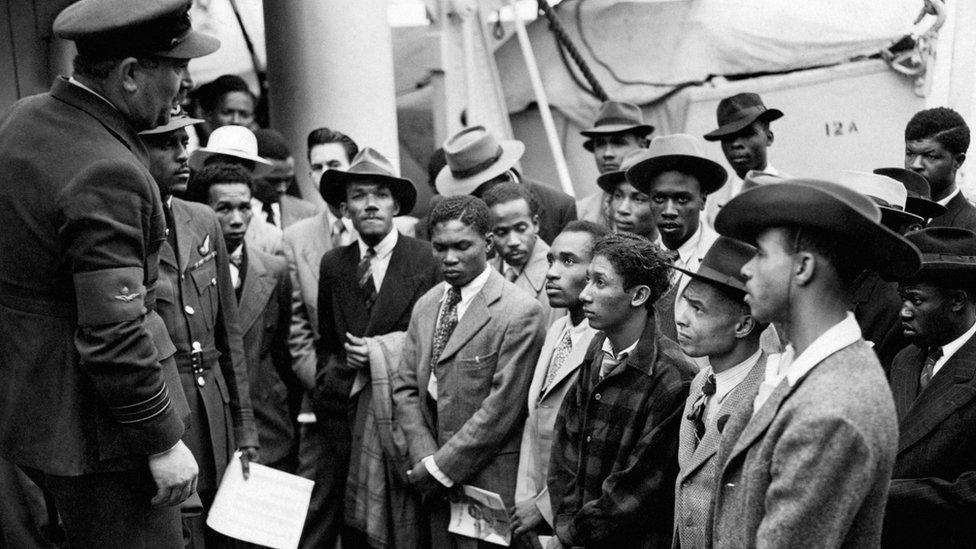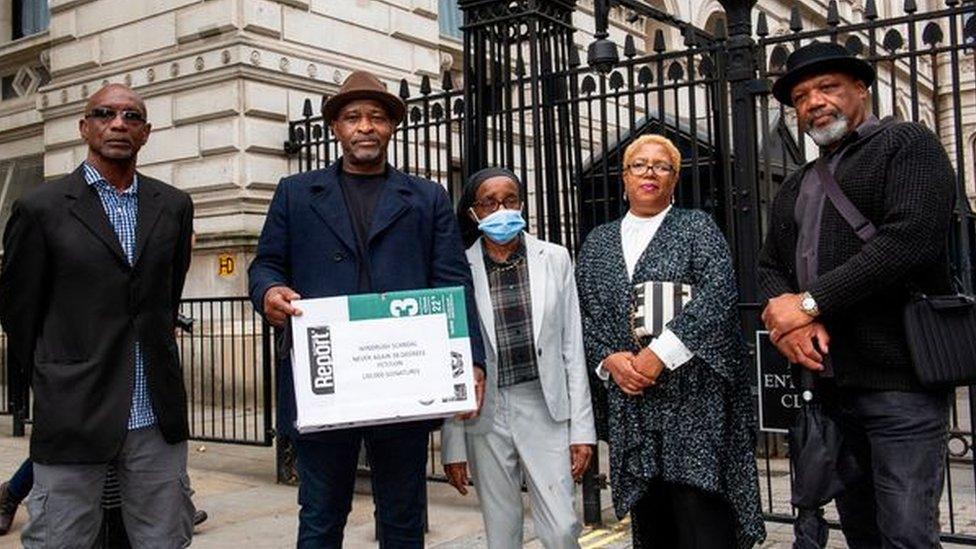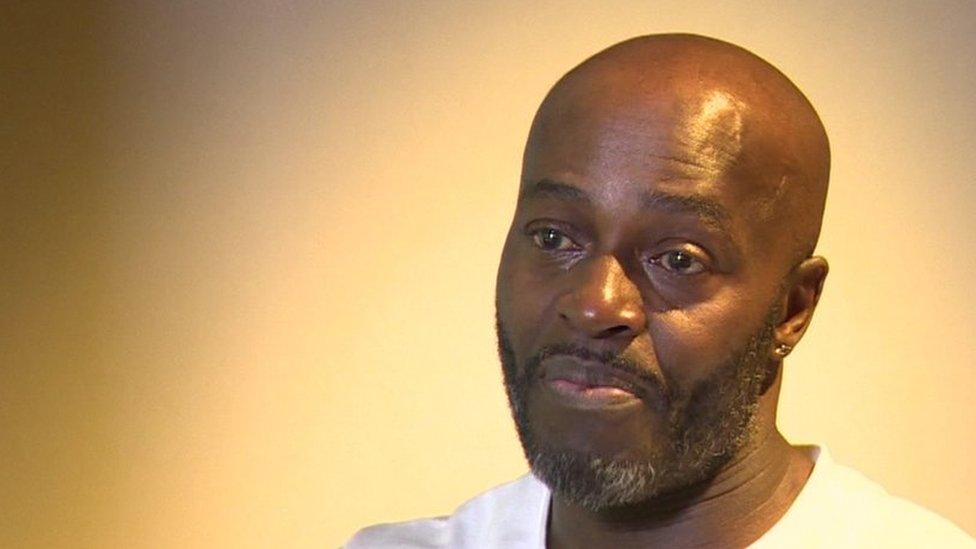Windrush survivor: Will we get government compensation before we die?
- Published
Johnny Samuels: "Priti Patel, Boris Johnson, do something"
A survivor of the Windrush scandal has said he and others will continue to fight for compensation, as MPs call for the Home Office to be stripped of running the payment scheme.
Johnny Samuels suggested the Home Office could be waiting for survivors to die before they were compensated.
Most who applied had yet to get a penny four years since the scandal emerged, a Home Affairs Committee report said.
A Home Office minister said removing it from the scheme could add more delays.
Kevin Foster, minister for Future Borders and Immigration, said the Home Office was increasing the number of case staff working on the compensation scheme - from 80 to 114. It is also looking to work with community groups and expanding in-person drop-in sessions, he added.
Speaking to BBC Radio 4's World At One programme, he said removing the compensation scheme "from the department with the most expertise in this area" would "potentially just add further delays in the process".
Mr Foster insisted the scheme was "not an adversarial process about defending the Home Office against all claims" but about "working with the claimant to find out the impact on them".
The Windrush scandal saw thousands of UK residents - most of whom were originally from the Caribbean - wrongly classed as illegal immigrants.
It resulted in thousands wrongly being denied healthcare, housing or the right to work - or being held detained or deported by immigration officials.
It affected people from the Windrush generation, who arrived in the UK from Caribbean countries between 1948 and 1971.
They were granted indefinite leave to remain in 1971, but thousands were children who had travelled on their parents' passports.
Because of this, many were unable to prove they had the right to live in the country when "hostile environment" immigration policies - demanding documentation be shown - began in 2012.
'Still in limbo'
Mr Samuels was eight when he moved from Jamaica to the UK in 1964, after his parents came to "rebuild Britain", he said.
He told BBC Breakfast he had been shocked to receive letters telling him he could no longer work and he had to leave.
"After 55 years in the UK, working and doing positive good, then the Home Office letter [arrived] telling me I'm an illegal immigrant and giving me six weeks to leave the country", he said.
The "embarrassment" of being ordered to leave the country while he was at work is a "stigma [that] doesn't go away" he said, adding that colleagues believed he was an illegal immigrant.
Mr Samuels, who lives in Coventry, said he was "still in limbo" when it came to receiving compensation, adding: "It really makes you wonder, is this carrot real, is it going to happen before we're put into the grave, and I think that sometimes that is what the Home Office is waiting for."
He vowed that "justice delayed is not going to be justice denied" and that Windrush survivors would "keeping fighting until our last breath", even if this meant marching in the streets.

The Empire Windrush ship brought one of the first large groups of Caribbean people to the UK
Echoing calls by MPs for the scheme to be removed from Home Office control, Mr Samuels called on the home secretary and the prime minister to act.
He said: "Why is it taking so long for us... to receive justice?
"I am sick and tired of being sick and tired of this matter.
"Priti Patel, Boris [Johnson], do something, because we are not going to die."
The cross-party Home Affairs Committee found that an official scheme launched in 2019 to compensate people affected had now become a further trauma for people applying, with a "litany of flaws" in its design and operation.
It concluded there were excessive burdens on claimants, inadequate staffing and long delays - and many of those affected "are still too fearful of the Home Office to apply".
The MPs recommended an "independent organisation" should be handed responsibility for running the scheme, to "increase trust and encourage more applicants".
The scheme contains many of the same bureaucratic insensitivities that led to the Windrush scandal in the first place, the report concluded.
The Home Office took too long to engage at grassroots level to build trust in the scheme, it added.
Such delays mean that by September 2021, only one in five of an estimated 15,000 eligible claimants had applied to the scheme and only a quarter of these had received compensation.
The MPs highlighted the fact that 23 individuals died before receiving any compensation.
The politicians welcomed changes made to the scheme in December 2020 to speed up payments - but said these "were long overdue" and did not go far enough.
"It is truly shocking how few people have received any compensation for the hardship they endured at the hands of the Home Office," said Yvette Cooper, who is chairwoman of the committee.

Campaigners took their case to Downing Street
"Urgent action is needed to get compensation to those who have been so badly wronged.
"It is staggering, given the failures of the Windrush scandal, that the Home Office has allowed some of the same problems to affect the Windrush Compensation Scheme too," she added.
The report urges the Home Office to:
encourage more of the Windrush generation to apply for compensation
ensure everyone affected is granted some compensation quickly
increase the amount paid
guarantee legal assistance for all claimants
give greater support to grassroots campaigns
Responding to the report, the Home Office said: "The home secretary and the department remain steadfast in our commitment to ensure that members of the Windrush generation receive every penny of compensation that they are entitled to.
"We continue to make improvements, such as simplifying the application process, hiring more caseworkers and removing the end date."

STING - 'IS THAT MY DESTINY?': The 100 million selling artist on family and fame
IN PRISON WITH NELSON MANDELA: Fellow inmate Ahmed Kathrada speaks about being imprisoned under the Apartheid regime

Related topics
- Published24 November 2021

